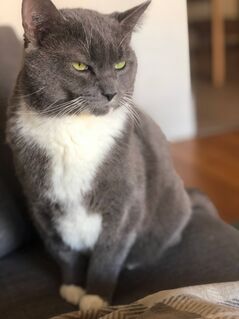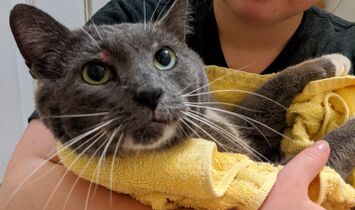Course:Wallie
| CRWR 501P 003 |
|---|
 |
| Advanced Writing of Poetry |
|
| Important Course Pages |
| Categories |
Wallie

My fiance and I adopted Wallie when he was six years old. Wallie, like many humans but unlike most cats, has an anxiety disorder, and spent several months warming up to our house. We kept him in a walk-in closet, leaving the door open in case he chose to venture into the rest of the apartment. Slowly, Wallie made forays into the space. For a long time, he retreated back to his closet at the sound of footsteps. After almost a year had passed, though, he was snuggling like your average (but still rather jumpy) kitty.
One day, Wallie ventured onto our third-floor balcony, got spooked, and jumped off. A well-placed fence and a raised ground floor saved him from injury, but he ran off into the jungle that was East Vancouver. When we didn’t find him that day, we were sure he was gone forever: hit by a car, the victim of a relatively large raccoon, adopted by some kindly neighbour with no idea he was missing. We made posters. We posted on Facebook. We knocked on doors. It was as if he had dissolved into the concrete. Wallie’s disappearance devastated us. To spare our sanity, we decided to move to Coquitlam, but as moving day drew closer, we couldn’t help but feel like we were abandoning him; after all, what if he was out there right now, finding his way home like those dogs in Homeward Bound?
This is where I answer the question I’m sure you’re asking: how is your cat an inspiration or influence?
A week before our move, two months after Wallie went off the balcony: we escape our apartment for an evening and go for a walk in the neighbourhood. We’re cutting through the parking lot of VCC when a cat appears -- not Wallie (yet). I go to pet it. It’s a friendly cat, rolling on the August-warmed concrete, purring loudly. The cat walks away, and we follow. It leads us to the sidewalk and sits. There’s a rustle and across the street, another cat appears: this one is grey and white; emaciated; jumpy. Wallie. He runs into a bush beside a building, and we are able to tempt him with some tuna. We get him home. After eight weeks on the streets, Wallie is in our bathtub. He has cuts on his face and is in desperate need of a meal, but he is home.
Finding Wallie didn’t make me believe in God, or anything, but it was the first indication that my life had actual, intentional meaning. I was perplexed: how is it possible that he found us again? Somehow, I feel sure we were meant to have him -- like in the greater, metaphysical sense. It made me think about what else in my life was “meant for me”, and even today causes me to reflect on why my life is the way it is. Though a bit of a silly story -- with a happy ending, thank goodness -- I know that finding Wallie impacted my life and my writing more than almost any other life event.
